2011年浙江高考英语答案
- 格式:doc
- 大小:198.00 KB
- 文档页数:26
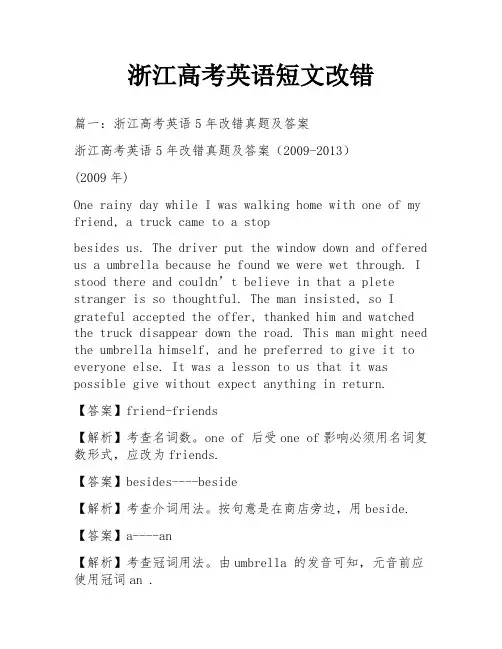
浙江高考英语短文改错篇一:浙江高考英语5年改错真题及答案浙江高考英语5年改错真题及答案(2009-2013)(2009年)One rainy day while I was walking home with one of my friend, a truck came to a stopbesides us. The driver put the window down and offered us a umbrella because he found we were wet through. I stood there and couldn’t believe in that a plete stranger is so thoughtful. The man insisted, so I grateful accepted the offer, thanked him and watched the truck disappear down the road. This man might need the umbrella himself, and he preferred to give it to everyone else. It was a lesson to us that it was possible give without expect anything in return.【答案】friend-friends【解析】考查名词数。
one of 后受one of影响必须用名词复数形式,应改为friends.【答案】besides----beside【解析】考查介词用法。
按句意是在商店旁边,用beside.【答案】a----an【解析】考查冠词用法。
由umbrella 的发音可知,元音前应使用冠词an .【答案】去掉believe后的in【解析】考查动词用法。
believe 为及物动词。
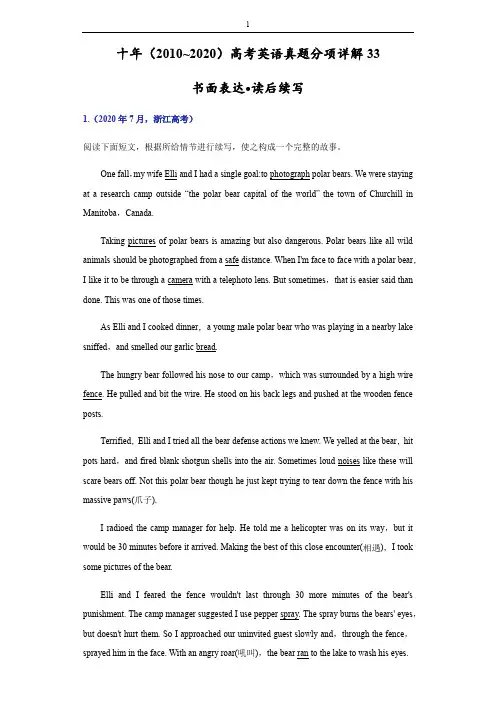
十年(2010~2020)高考英语真题分项详解33书面表达·读后续写1.(2020年7月,浙江高考)阅读下面短文,根据所给情节进行续写,使之构成一个完整的故事。
One fall,my wife Elli and I had a single goal:to photograph polar bears. We were staying at a research camp outside “the polar bear capital of the world”-the town of Churchill in Manitoba,Canada.Taking pictures of polar bears is amazing but also dangerous. Polar bears-like all wild animals-should be photographed from a safe distance. When I'm face to face with a polar bear,I like it to be through a camera with a telephoto lens. But sometimes,that is easier said than done. This was one of those times.As Elli and I cooked dinner,a young male polar bear who was playing in a nearby lake sniffed,and smelled our garlic bread.The hungry bear followed his nose to our camp,which was surrounded by a high wire fence. He pulled and bit the wire. He stood on his back legs and pushed at the wooden fence posts.Terrified,Elli and I tried all the bear defense actions we knew. We yelled at the bear,hit pots hard,and fired blank shotgun shells into the air. Sometimes loud noises like these will scare bears off. Not this polar bear though-he just kept trying to tear down the fence with his massive paws(爪子).I radioed the camp manager for help. He told me a helicopter was on its way,but it would be 30 minutes before it arrived. Making the best of this close encounter(相遇),I took some pictures of the bear.Elli and I feared the fence wouldn't last through 30 more minutes of the bear's punishment. The camp manager suggested I use pepper spray. The spray burns the bears' eyes,but doesn't hurt them. So I approached our uninvited guest slowly and,through the fence,sprayed him in the face. With an angry roar(吼叫),the bear ran to the lake to wash his eyes.注意:1. 所续写短文的词数应为150左右;2. 至少使用5个短文中标有下划线的关键词语;3. 续写部分分为两段,每段的开头语已为你写好;4. 续写完成后,请用下划线标出你所使用的关键词语。
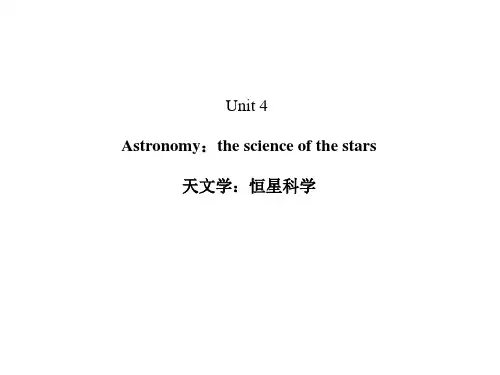
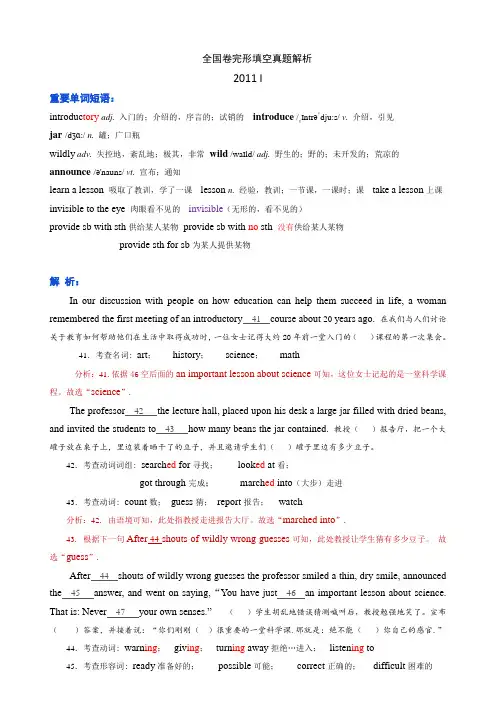
全国卷完形填空真题解析2011 I重要单词短语:introduc tory adj. 入门的;介绍的,序言的;试销的introduce /ˌɪntrəˈdju:s/ v. 介绍,引见jar/dʒɑ:/ n. 罐;广口瓶wildly adv.失控地,紊乱地;极其,非常wild /waɪld/ adj.野生的;野的;未开发的;荒凉的announce/ə'nauns/ vt.宣布;通知learn a lesson 吸取了教训,学了一课lesson n. 经验,教训;一节课,一课时;课take a lesson上课invisible to the eye 肉眼看不见的invisible(无形的,看不见的)provide sb with sth供给某人某物provide sb with no sth 没有供给某人某物provide sth for sb为某人提供某物解析:In our discussion with people on how education can help them succeed in life, a woman remembered the first meeting of an introductory41 course about 20 years ago. 在我们与人们讨论关于教育如何帮助他们在生活中取得成功时,一位女士记得大约20年前一堂入门的()课程的第一次集会。
41.考查名词: art;history;science;math分析:41.依据46空后面的an important lesson about science可知,这位女士记起的是一堂科学课程。
故选“science”.The professor42 the lecture hall, placed upon his desk a large jar filled with dried beans, and invited the students to43 how many beans the jar contained. 教授()报告厅,把一个大罐子放在桌子上,里边装着晒干了的豆子,并且邀请学生们()罐子里边有多少豆子。
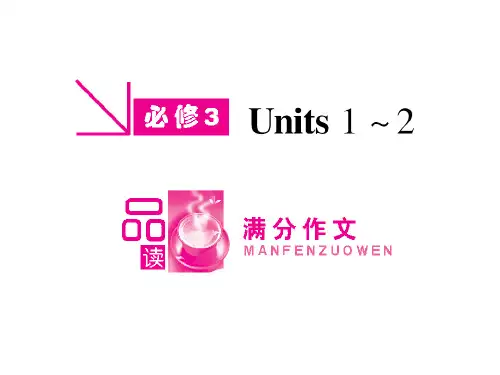
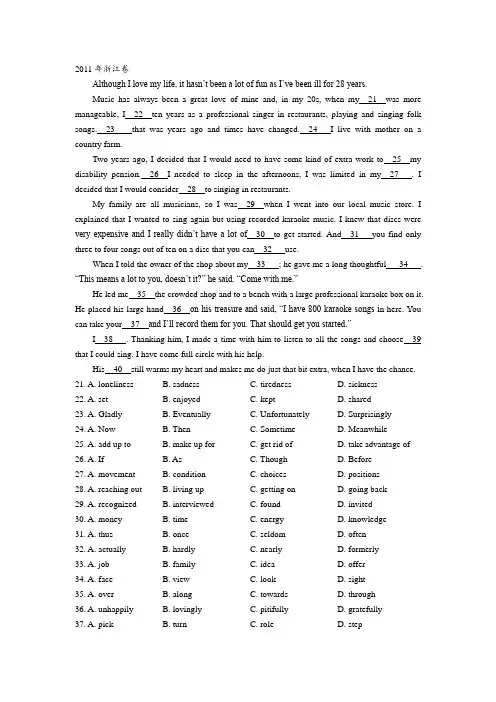
2011年浙江卷Although I love my life, it hasn’t been a lot of fun as I’ve been ill for 28 years.Music has always been a great love of mine and, in my 20s, when my 21 was more manageable, I 22 ten years as a professional singer in restaurants, playing and singing folk songs. 23 that was years ago and times have changed. 24 I live with mother on a country farm.Two years ago, I decided that I would need to have some kind of extra work to 25 my disability pension. 26 I needed to sleep in the afternoons, I was limited in my 27 . I decided that I would consider 28 to singing in restaurants.My family are all musicians, so I was 29 when I went into our local music store. I explained that I wanted to sing again but using recorded karaoke music. I knew that discs were very expensive and I really didn’t have a lot of30 to get started. And 31 you find only three to four songs out of ten on a disc that you can 32 use.When I told the owner of the shop about my 33 ; he gave me a long thoughtful 34 . “This means a lot to you, doesn’t it?” he said. “Come with me.”He led me 35 the crowded shop and to a bench with a large professional karaoke box on it. He placed his large hand 36 on his treasure and said, “I have 800 karaoke songs i n here. You can take your 37 and I’ll record them for you. That should get you started.”I 38 . Thanking him, I made a time with him to listen to all the songs and choose 39 that I could sing. I have come full circle with his help.His 40 still warms my heart and makes me do just that bit extra, when I have the chance.21. A. loneliness B. sadness C. tiredness D. sickness22. A. set B. enjoyed C. kept D. shared23. A. Gladly B. Eventually C. Unfortunately D. Surprisingly24. A. Now B. Then C. Sometime D. Meanwhile25. A. add up to B. make up for C. get rid of D. take advantage of26. A. If B. As C. Though D. Before27. A. movement B. condition C. choices D. positions28. A. reaching out B. living up C. getting on D. going back29. A. recognized B. interviewed C. found D. invited30. A. money B. time C. energy D. knowledge31. A. thus B. once C. seldom D. often32. A. actually B. hardly C. nearly D. formerly33. A. job B. family C. idea D. offer34. A. face B. view C. look D. sight35. A. over B. along C. towards D. through36. A. unhappily B. lovingly C. pitifully D. gratefully37. A. pick B. turn C. role D. step38. A. had to cry B. ought to cry C. should have cried D. could have cried39. A. more B. the ones C. few D. the rest40. A. courage B. devotion C. kindness D. trust2012年浙江卷“Just sign here, sir,” the deliveryman said as he handed Oscar Reyna a package.The package consisted of a long , narrow box ___21____ wrapped in brown paper. __22___ the box, Oscar saw an umbrella inside -- a very old one with a beautifully carved wooden handle. ____23___He had not seen it in more than 20 years, he recognized it ____24____.Oscar was 16 when he first saw the ___25____ umbrella. He had gone to a concert with his grandparents. As they were leaving, he noticed an umbrella on an empty seat. Impressed by its ____26____, Oscar felt a strong desire to find its ___27____.Oscar ___28____ the manager to look in the record of advance ticket sales. Just as he thought, a name matched the seat ____29___ Oscar had found the umbrella. The name was Mrs. Katie O'brien.Oscar talked his grandparents into going by Mrs O'brien's ___30____ on their way home. He rang the bell , the door opened, and an elderly woman appeared. “May I __31___ you?” she asked.“I'd like to return it if it`s yours,” Osca r said, ____32____ the umbrella as if presenting a ___33___ that had long been wished for.“Why, yes! it's mine,”replied Mrs. O`Brien with a ___34____ smile and shining eyes. “It was given to me by my father years ago. Thank you so much for returning it. May I offer you a reward for your ____35____ ?”“No, ma’am,” he said, “my grandmother says that a good deed is its own reward.”“Well, that 's ____36_____ what my father used to say. What is your name, Young man?”Years later, Oscar was staring at the finely carved handle of the umbrella as he remembered Mrs. O' Brien. It was in perfect condition, considering how__37__ it was. Why had it arrived here today?As if ___38____, a note fell from the paper. It read: Mrs. O'Brien wanted you to ___39___ this umbrella as a present for a kind, __40___gesture long ago.21. A. strictly B. carefully C. roughly D. casually22. A. Opening B. Seizing C. Observing D. Searching23. A. After B. When C. Since D. Although24. A. clearly B. fully C. immediately D. suddenly25. A. average B. unusual C. plain D. typical26. A. beauty B. shape C. origin D. history27. A. designer B. seller C. user D. owner28. A. convinced B. forced C. encouraged D. advised29. A. until B. before C. which D. where30. A. family B. theater C. house D. neighborhood31. A. invite B. help C. bother D. know32. A. putting up B. turning out C. picking up D. holding out33. A. chance B. fact C. gift D. result34. A. wide B. confident C. proud D. shy35. A. patience B. kindness C. courage D. determination36. A. obviously B. naturally C. exactly D. probably37. A. old B. rare C. precious D. nice38. A. in contrast B. in return C. in exchange D. in answer39. A. possess B. accept C. carry D. value40. A. attractive B. significant C. unselfish D. sympathetic2013年浙江卷Last spring, I was fortunate to be chosen to participate in an exchange study. In my application letter, I was careful to 21 how much I wanted to see France; evidently, my excitement really came through in my words. Once I 22 that I was going, all I could think about was the fun of foreign travel and all sorts of new and 23 friends. While travelling was inspiring and meeting people was 24 , nothing about my term in France was what I 25 .The moment I arrived in Paris, I was 26 by a nice French couple who could become my host parents. My experience was joyous and exiting 27 I received some shocking news from my program coordinator (协调人): there had been a death in my host parents’ extended family. They had to travel outside France for several weeks. That afternoon, I had to 28 out of one family’s house and into another. The exchange coordinator told me, I’d have a 29 this time and asked whether I could share a bedroom with an English speaker. To avoid the temptation (诱惑) to 30 my native language, I asked not to be 31 with an English-speaking language roommate. When I got to my new room , I 32 myself to my new roommate Paolo, a Brazilian (巴西人) , the same age as I, whom I was surprised to find playing one of my favorite CDs! In just a few hours, we knew we would be good friends for the rest of the 33 .I left France with many 34 , so when people ask me what my favorite part of this trip was, they are always 35 to hear me talk about my Brazilian friend Paolo and the scores of the weekdays in class, weeknights on the town, and weekends 36 France we enjoyed together. I love how people 37 seem so different, but end up being so 38 . The most valuable lesson, I gained from the studying in France wasn’t just to respect the French people 39 to respect all people , for your next best friend could be just a continent away. I would recommend exchange program to anyone who wants to experience foreign cultures and gain meaningful 40 .21. A. discuss B. express C. announce D. argue22. A. approved B. knew C. warned D. denied23. A. stubborn B. anxious C. universal D. interesting24. A. boring B. upsetting C. exciting D. promising25. A. expected B. liked C. doubled D. feared26. A. sponsored B. witnessed C. greeted D. supported27. A. until B. when C. since D. while28. A. move B. travel C. walk D. rush29. A. housekeeper B. leader C. roommate D. colleague30. A. learn B. appreciate C. speak D. master31. A. combined B. fitted C. involved D. placed32. A. added B. introduced C. devoted D. adapted33. A. term B. week C. month D. vacation34. A. presents B. suitcases C. stories D. dreams35. A. surprised B. disturbed C. embarrassed D. concerned36. A. analyzing B. exploring C. describing D. investigating37. A. need B. shall C. must D. can38. A. generous B. independent C. similar D. distant39. A. and B. but C. or D. so40. A. instructions B. friendships C. facts D. data36more, and became happy. And it was all because he37to be the last kid in the last row. The boy who most needed38was the one who took the last seat that day.It taught me the most39lesson over the years of my teaching career, and I’m thankful that it came40and positively. A small kindness can indeed make a difference.21. A. cleaner B. reporter C. monitor D. teacher22. A. Or B. And C. But D. So23. A. courage B. abilities C. feelings D. dream24. A. desperate B. responsible C. unprepared D. unsuitable25. A. Because of B. In spite of C. Apart from D. As for26. A. loved B. envied C. pleased D. criticized27. A. gradually B. constantly C. recently D. obviously28. A. self-respect B. self-doubt C. self-pity D. self-defense29. A. imagining B. observing C. wondering D. regretting30. A. also B. even C. always D. still31. A. expect B. remember C. believe D. accept32. A. writing B. reviewing C. editing D. giving33. A. quietly B. repeatedly C. quickly D. firmly34. A. lucky B. lonely C. only D. likely35. A. entrance B. middle C. front D. back36. A. slept B. smiled C. shouted D. quarreled37. A. intended B. pretended C. refused D. happened38. A. change B. praise C. thanks D. visits39. A. difficult B. painful C. valuable D. enjoyable40. A. early B. slowly C. frequently D. occasionally2015年浙江卷Since finishing my studies at Harvard and Oxford I’ve watched one friend after another land high-ranking, high-paying Wall Street jobs. As executives (高级管理人员) with banks, consulting firms ,established law firms, and major corporations, many are now__ 21___ on their way to impressive careers. By society’s ___22___they seem to have it made.On the surface these people seem to be very lucky in life. As they left student life behind many had a ____23____ drink at their cheap but friendly local bar, shook hands with longtime roommates, and____24____ out of small apartments into high buildings. They made reservations at restaurants where the cost of a bottle of wine ___25____a college year’s monthly rent. They replaced their beloved old cars with expensive new sports cars.The thing is, a number of them have____26___that despite their success, they aren’t happy. Some____27___of unfriendly coworkers and feel sad for eight-hour workweeks devoted to tasks they___28 ___. Some do not respect the companies they work for and talk of feeling tired and ___29____. However, instead of devoting themselves to their work, they find themselves working to support the____30____ to which they have so quickly become ____31____.People often speak of trying a more satisfying path and____32_____in the end the idea of leaving their jobs to work for something they____33____or finding a position that would give them more time with their families almost always leads them to the same conclusion: it’s ____34_____. They have loans, bills ,a mortgage(抵押贷款)to____35____, retirement to save for. They recognize there’s something____36_____ in their lives but it’s____37_____to step off the track.In a society that tends to ____38____ everything in terms of dollars and cents, we learn from a young age to consider the costs of our ___39____in financial terms. But what about the personal and social costs ___40______in pursuing money over meaning? These are exactly the kinds of costs many of us tend to ignore -- and the very ones we need to consider most.21. A. much B. never C. seldom D. well22. A. policies B. standards C. experiments D. regulations23. A. last B. least C. second D. best24. A. cycled B. moved C. slid D. looked25. A. shared B. paid C. equaled D. collected26. A. advertised B. witnessed C. admitted D. demanded27. A. complain B. dream C. hear D. approve28. A. distribute B. hate C. applaud D. overlook29. A. calm B. guilty C. warm D. empty30. A. family B. government C. lifestyle D. project31. A. accustomed B. appointed C. unique D. available32. A. yet B. also C. instead D. rather33. A. let out B. turn in C. give up D. believe in34. A. fundamental B. practical C. impossible D. unforgettable35. A. take off B. drop off C. put off D. pay off36. A. missing B. inspiring C. sinking D. shining37. A. harmful B. hard C. useful D. normal38. A. measure B. suffer C. digest D. deliver39. A. disasters B. motivations C. campaigns D. decisions40. A. assessed B. involved C. covered D. reduced2016年浙江卷During the war, my husband was stationed at an army camp in a desert in California. I went to live there in order to be 21 him. I hated the place. I had never 22 been so unhappy. My husband was ordered out on a long-term duty, and I was left in a tiny shack(棚屋) alone. The heat was 23 —almost 125 0F even in the shade of a cactus(仙人掌). 24 a soul to talk to. The wind blew non-stop, and all the food I ate, and the very air I breathed, were 25 with sand, sand, sand!I was so sorry for myself that I wrote to my parents. I told them I was 26 and coming back home. I said I couldn’t stand it one minute longer. I27 be in prison! My father answered my 28 with just two lines -- two lines that will always sing in my 29 -- two lines that completely changed my life :Two men looked out from prison bars,One saw the mud, the other saw the stars.I read those two lines 30 . I was ashamed of myself. I made up my mind I would find out what was good in my present 31 : I would look for the stars.I made friends with the natives, and their 32 amazed me. They gave me presents of their favorite artworks which they had 33 to sell to tourists. I studied the delightful forms of the cactus. I watched for the desert sunsets, and 34 for seashells that had been left there millions of years ago when the desert had been an ocean 35 .What brought about this 36 change in me? The desert hadn’t changed,37 I had. I had changed my 38 . And by doing so, I changed an unhappy experience into the most amazing 39 of my life. I was excited by this new world that I had discovered. I had looked out of my self-created prison and 40 the stars.21. A. off B. behind C. near D. beyond22. A. before B. already C. then D. still23. A. inflexible B. incomprehensible C. uncontrollable D. unbearable24. A. Only B. Not C. Many D. Such25. A. covered B. filled C. buried D. charged26. A. catching up B. keeping up C. giving up D. getting up27. A. ought to B. might well C. would rather D. had better28. A. request B. call C. question D. letter29. A. comparison B. imagination C. consideration D. memory30. A. over and over B. by and by C. up and down D. now and then31. A. company B. occupation C. situation D. relationship32. A. movement B. reaction C. guidance D. purpose33. A. refused B. failed C. managed D. happened34. A. asked B. hunted C. waited D. headed35. A. floor B. surface C. rock D. level36. A. moving B. challenging C. puzzling D. astonishing37. A. as B. but C. for D. or38. A. attitude B. principle C. identity D. standard39. A. vacation B. operation C. affair D. adventure40. A. sought B. counted C. found D. reached2017年浙江卷Alia Baker is a librarian in Iraq. Her library used to be a ____36 ___ place for all who loved books and liked to share knowledge. They ____37 ____ various matters all over the world. When the war was near, Alia was ____38 ____that the fires of war would destroy the books, which are more ___39 ____ to her than mountains of gold. The books are in every language — new books, ancient books, ___40____a book on the history of Iraq that is seven hundred years old.She had asked the government for ____41 ____to move the books to a ____42____place, but they refused. So Alia took matters into her own hands. ____43 _____, she brought books home every night, ____44 ____her car late after work. Her friends came to ____45 ____her when the war broke out. Anis who owned a restaurant ____46 ____ to hide some books. All through the ___47 __, Alia, Anis, his brothers and neighbours took the books from the library, ___48 ___them over the seven-foot wall and ____49 ___them in the restaurant. The books stayed hidden as the war ____50 ____. Then nine days later, a fire burned the ____51 _____to the ground.One day, the bombing stopped and the ____52 ____ left. But the war was not over yet. Alia knew that if the books were to be safe, they must be ____53 _____ again while the city was ____54 ____. So she hired a truck to bring all the books to the houses of friends in the suburbs(郊区). Now Alia waited for the war to end and ____55 ____ peace and a new library.36. A. meeting B. working C. personal D. religious37. A. raised B. handled C. reported D. discussed38. A. worried B. angry C. doubtful D. curious39. A. practical B. precious C. reliable D. expensive40. A. then B. still C. even D. rather41. A. permission B. confirmation C. explanation D. information42. A. large B. public C. distant D. safe43. A. Fortunately B. Surprisingly C. Seriously D. Secretly44. A. starting B. parking C. filling D. testing45. A. stop B. help C. warn D. rescue46. A. intended B. pretended C. happened D. agreed47. A. war B. night C. building D. way48. A. put B. opened C. passed D. threw49. A. hid B. exchanged C. burnt D. distributed50. A. approached B. erupted C. continued D. ended51. A. restaurant B. library C. city D. wall52. A. neighbours B. soldiers C. friends D. customers53. A. sold B. read C. saved D. moved54. A. occupied B. bombed C. quiet D. busy55. A. dreamed of B. believed in C. cared about D. looked for2018年浙江卷We have all heard how time is more valuable than money, but is it 36 to have too much time?I 37 back in high school I spent most of my day at school since I also 38 a team sport. By the time I got home, I only had a few hours to do my homework, and I had to do it 39 .When I got into college, things 40 . I suddenly found myself out of class before noon time. Because of all this 41 time, there was no sense of 42 to do my school work immediately. I was performing this action of waiting until it later became a 43 . Once that happened, I just kept 44 my studying further and further back in my day. Then I got to the point where I was 45 really late at night to get my work done.One day I 46 a former classmate of mine who was 47 a lot of money running a sideline (副业). Since his regular job was 48 , I asked him why he just didn’t do his sideline full-time. He said without the job, he would 49 have too much time and would just do what I did back in 50 . He said that if he 51 the job, he would lose his 52 to work and succeed.So, try 53 your time with other work. This is why there is a 54 that if you want something done, ask a 55 person to do it.36. A. true B. fair C. strange D. possible37. A. remember B. admit C. understand D. expect38. A. watched B. loved C. coached D. played39. A. at last B. right away C. of course D. as usual40. A. happened B. repeated C. changed D. mattered41. A. extra B. difficult C. valuable D. limited42. A. duty B. achievement C. urgency D. direction43. A. burden B. relief C. risk D. habit44. A. pushing B. taking C. setting D. calling45. A. hanging out B. staying up C. jogging round D. showing off46. A. met B. helped C. treated D. hired47. A. raising B. wasting C. demanding D. making48. A. safe B. important C. boring D. rewarding49. A. luckily B. hardly C. hopefully D. simply50. A. childhood B. college C. town D. business51. A. quit B. found C. accepted D. kept52. A. heart B. chance C. drive D. way53. A. saving B. filling up C. giving up D. trading54. A. message B. story C. saying D. fact55. A. careful B. busy C. reliable D. kin2019年浙江卷There are lots of ways to raise awareness for a cause. Usually, the 36 the idea is, the more it gets noticed. And that’s pr ecisely why one 37 Frenchman has caught our attention.Baptiste Dubanchet is biking across Europe, surviving 38 on discarded (丢弃)food. The three-month, 1,900-mile journey from Paris to Warsaw is Dubanchet’s39 of raising awareness of food waste in Europe and throughout the world.As you can 40 , the trip is no piece of cake. While restaurants 41 tons of food each year, much of it remains inaccessible because of 42 garbage containers, health regulations, or business policies. Only about one in ten places 43 him food that would otherwise be discarded. For legal 44 , most restaurants have a policy against 45 food waste. “Some people have even46 their jobs by giving me food,” Dubanchet said.What’s47 interesting is the attitude various cities have toward Dubanchet’s cause. Berlin has been the 48 while the most difficult was the Czech town of Pilsen. There, he had to 49 at some different stores or restaurants before finding food. The 50 is all the more serious when you consider the 51 exercise required to bike from France to Poland.“I have to get food52 because after all the biking I am tired and I need the 53 ,” Dubanchet explained. “I s my 54 full or empty? That is the most important thing, not what I am eating.”He aims to 55 his journey by mid-July. With any luck, he’l l turn a few more heads in the process.36. A. cleverer B. older C. stranger D. simpler37. A. garbage-eating B. sports-loving C. food-wasting D. law-breaking38. A. secretly B. finally C. entirely D. probably39. A. purpose B. way C. opinion D. dream40. A. observe B. imagine C. suggest D. remember41. A. store B. cook C. shop for D. throw away42. A. locked B. damaged C. connected D. abandoned43. A. bought B. offered C. ordered D. sold44. A. reasons B. rights C. fees D. aids45. A. begging for B. giving away C. hiding D. causing46. A. did B. kept C. accepted D. risked47. A. hardly B. usually C. particularly D. merely48. A. easiest B. nearest C. biggest D. richest49. A. work B. shout C. ask D. jump50. A. competition B. conversation C. conflict D. challenge51. A. adequate B. rewarding C. demanding D. suitable52. A. again B. alone C. later D. fast53. A. spirit B. energy C. time D. effort54. A. stomach B. hand C. pocket D. basket55. A. arrange B. restart C. report D. finish2020年1月浙江卷I was born legally blind. Of all the stories of my early childhood, the one about a___36___is my mother’s favorite.I was only two when the___37___occurred. We had just arrived home from a trip. Mom lifted me out of the car and ___38___to speak to the driver. I took advantage of my brief___39___to dash across the lawn(草坪) and hit a large maple tree! I was running so fast that I bounced off the trunk and___40___on my backside. Mom___41___me to start crying, but I just sat there for a minute. Then I___42___myself up and kept right on going. Mom always___43___here that, as many times as I___44___across the lawn after that, I never again___45___into that tree.Mom loves to use this story as an___46___. It reminds her that chil dren don’t enter life___47___to take risks or unwilling to___48___again when they fall down. She never wantedme to lose that___49___as I grew older. When I___50___my major life decisions, I was still that little girl tearing full-speed across the lawn. I studied abroad and later moved away from my parents’home to look for a___51___. Through years of___52___, I have become a respected teacher in a school serving high-need students.We are almost certain to get___53___at some point during the process of achieving our goal. When that happens, don’t sit in the grass and___54___. Just get up and keep on going. It will all be worth it___55___.36. A. trip B. race C. tree D. driver37. A. incident B. change C. illness D. problem38. A. feared B. refused C. forgot D. turned39. A. delay B. absence C. freedom D. rest40. A. landed B. slept C. laughed D. wept41. A. promised B. encouraged C. allowed D. expected42. A. woke B. picked C. warmed D. gave43. A. adds B. replies C. admits D. supposes44. A. drove B. lived C. stood D. zoomed45. A. crashed B. broke C. climbed D. looked46. A. answer B. example C. excuse D. order47. A. able B. ashamed C. afraid D. anxious48. A. ask B. share C. learn D. try49. A. honesty B. toughness C. kindness D. curiosity50. A. regretted B. reviewed C. made D. explained51. A. job B. friend C. fortune D. house52. A. memories B. efforts C. research D. experience53. A. mixed up B. fed up C. knocked down D. settled down54. A. play B. relax C. dream D. cry55. A. all at once B. in the end C. in either case D. as a result2020年7月浙江卷I’ve been farming sheep on a hillside for 54 years. I use a small tractor to get about. My dog Don always sits beside me in the passenger seat.One morning I 36 a lost lamb when I was in the top field, near where a motorway cutsthrough my land. The lamb had become separated from its 37 , so I jumped out of the tractor to 38 it while Don stayed in his seat.Lamb and mother 39 , I turned back to the tractor only to see it move suddenly away from me. This was so 40 because I had put the handbrake on when I jumped out. 41 Don had somehow made the 42 move.My heart froze in my chest as I 43 the tractor heading towards the 44 . I ran desperately but failed to 45 . It crashed through a wooden fence and disappeared. The 46 thing I saw was Don’ s face, looking calmly back at me.Heart in mouth, I 47 the fence and looked over. The tractor was 48 against the crash barrier in the central reservation, having miraculously(奇迹般地) crossed the 49 road with fast-flowing traffic. I couldn’t see Don, but as I 50 the tractor he jumped out onto the road, apparently 51 , and dashed back to me.The police 52 and the motorway ran normally again. I couldn’t quite believe my53 : it turned out no one got badly hurt, but the outcome could have been 54 . Don was given a special 55 that night —I didn’t want him thinking I was angry with him.36. A. dropped B. spotted C. carried D. returned37. A. kids B. friends C. owner D. mother38. A. ask about B. play with C. tend to D. run into39. A. freed B. switched C. reunited D. examined40. A. unexpected B. dangerous C. embarrassing D. difficult41. A. Fortunately B. Generally C. Immediately D. Obviously42. A. lamb B. vehicle C. seat D. fence43. A. saw B. stopped C. remembered D. drove44. A. crowd B. motorway C. field D. hill45. A. take off B. catch up C. hold back D. get out46. A. real B. best C. basic D. last47. A. fixed B. noticed C. reached D. closed48. A. resting B. running C. parking D. turning49. A. steep B. long C. rough D. busy50. A. abandoned B. approached C. recognized D. repaired51. A. unclean B. uncertain C. unhurt D. unhappy52. A. arrived B. replied C. survived D. waited53. A. ability B. dream C. luck D. idea54. A. common B. confusing C. desirable D. awful55. A. meal B. test C. job D. lesson2021年1月浙江卷Last year I decided to do some volunteer work. I began to 36 on the Internet and discovered Volunteer USA.Three months later I 37 myself on a plane to Phoenix, Arizona. I was 38 at the thought of living with loads of new people for three months. However, within fifteen minutes of 39 , my worries had gone. Everyone was so 40 and like-minded that it was very 41 to feel at home.I was sent to the Coronado National Forest for my first 8-day 42 . We had to 43 everything we needed and walk three miles to where we worked. It may not seem like a 44 way but in 35℃heat and with a heavy pack, my legs were on fire.My job was to 45 a stairway out of rock. This 46 climbing up and down the side of a mountain inhabited (栖息) by mountain lions, although I should say they were only heard, never 47 .Three days later, a beautiful stairway came into being. The 48 of knowing that my 49 will be on that mountainside for years to come is massive.But on the last night we were 50 in a thunderstorm. I woke up at midnight to find a swimming pool in my tent. The temperature was close to 51 . I had to spend the rest of the night trembling in the only 52 part of my tent.53 , I suffered a lot. But I know whatever I have to face in my life I was there and I54 . I think I am much 55 for having taken part in the project.36. A. calculate B. negotiate C. advertise D. research37. A. imagined B. introduced C. enjoyed D. found38. A. annoyed B. surprised C. scared D. excited39. A. arriving B. sleeping C. thinking D. walking40. A. confident B. friendly C. energetic D. curious41. A. funny B. good C. lucky D. easy42. A. tour B. project C. campaign D. course43. A. drop B. make C. carry D. buy44. A. nice B. safe C. long D. quick45. A. build B. test C. clean D. guard46. A. helped B. ended C. allowed D. meant47. A. hunted B. trained C. seen D. fed48. A. satisfaction B. ambition C. expectation D. intention。
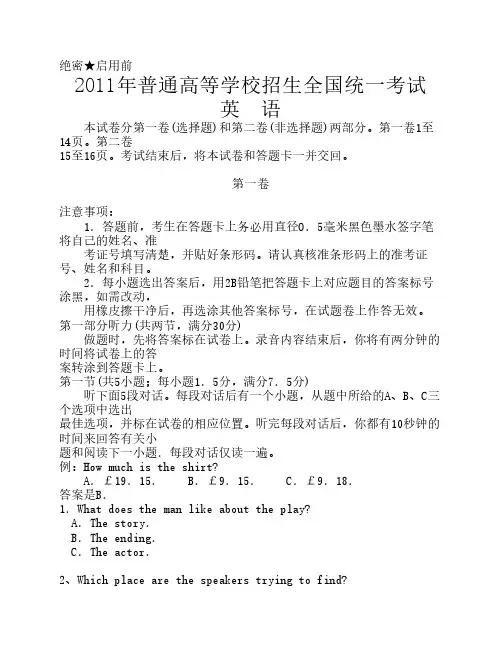
绝密★启用前2011年普通高等学校招生全国统一考试英 语本试卷分第一卷(选择题)和第二卷(非选择题)两部分。
第一卷1至14页。
第二卷15至16页。
考试结束后,将本试卷和答题卡一并交回。
第一卷注意事项:1.答题前,考生在答题卡上务必用直径O.5毫米黑色墨水签字笔将自己的姓名、准考证号填写清楚,并贴好条形码。
请认真核准条形码上的准考证号、姓名和科目。
2.每小题选出答案后,用2B铅笔把答题卡上对应题目的答案标号涂黑,如需改动,用橡皮擦干净后,再选涂其他答案标号,在试题卷上作答无效。
第一部分听力(共两节,满分30分)做题时,先将答案标在试卷上。
录音内容结束后,你将有两分钟的时间将试卷上的答案转涂到答题卡上。
第一节(共5小题;每小题1.5分,满分7.5分)听下面5段对话。
每段对话后有一个小题,从题中所给的A、B、C三个选项中选出最佳选项,并标在试卷的相应位置。
听完每段对话后,你都有10秒钟的时间来回答有关小题和阅读下一小题.每段对话仅读一遍。
例:How much is the shirt?A.£19.15. B.£9.15. C.£9.18.答案是B.1.What does the man like about the play?A.The story.B.The ending.C.The actor.2、Which place are the speakers trying to find?B.bank.C.restaurant.3.At what time will the two speakers meet?A.5:20.B.5:lO.C.4:40.4.what will the man do?A.Change the plan.B.Wait for a phone call.C.Sort things out.5.What does the woman want to do?A.See a film with the man.B.Offer the mall some help.C.Listen to some great music.第二节(共1 5小题:每小题1.5分,满分22.5分)听下面5段对话。
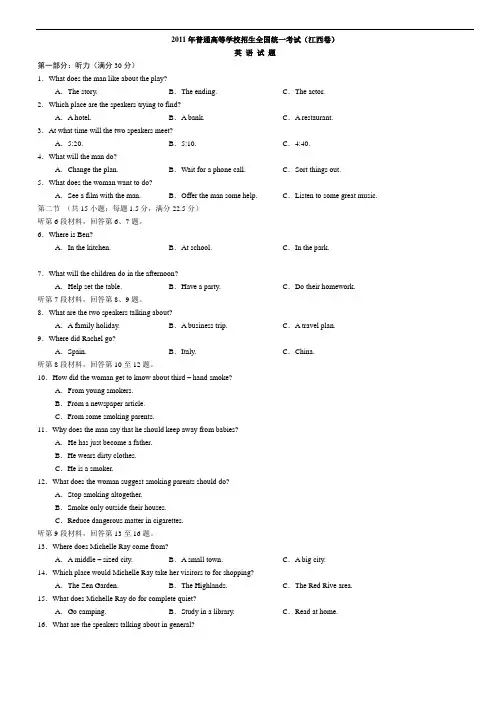
2011年普通高等学校招生全国统一考试(江西卷)英语试题第一部分:听力(满分30分)1.What does the man like about the play?A.The story. B.The ending. C.The actor.2.Which place are the speakers trying to find?A.A hotel. B.A bank. C.A restaurant.3.At what time will the two speakers meet?A.5:20. B.5:10. C.4:40.4.What will the man do?A.Change the plan. B.Wait for a phone call. C.Sort things out.5.What does the woman want to do?A.See a film with the man. B.Offer the man some help. C.Listen to some great music. 第二节(共15小题;每题1.5分,满分22.5分)听第6段材料,回答第6、7题。
6.Where is Ben?A.In the kitchen. B.At school. C.In the park.7.What will the children do in the afternoon?A.Help set the table. B.Have a party. C.Do their homework.听第7段材料,回答第8、9题。
8.What are the two speakers talking about?A.A family holiday. B.A business trip. C.A travel plan.9.Where did Rachel go?A.Spain. B.Italy. C.China.听第8段材料,回答第10至12题。
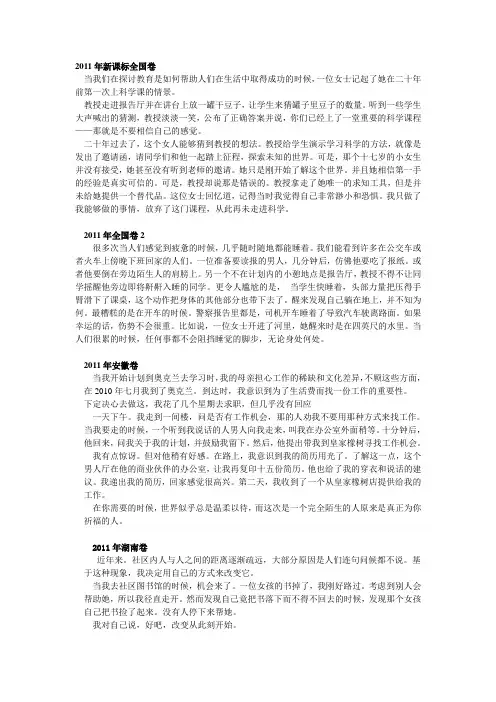
2011年新课标全国卷当我们在探讨教育是如何帮助人们在生活中取得成功的时候,一位女士记起了她在二十年前第一次上科学课的情景。
教授走进报告厅并在讲台上放一罐干豆子,让学生来猜罐子里豆子的数量。
听到一些学生大声喊出的猜测,教授淡淡一笑,公布了正确答案并说,你们已经上了一堂重要的科学课程——那就是不要相信自己的感觉。
二十年过去了,这个女人能够猜到教授的想法。
教授给学生演示学习科学的方法,就像是发出了邀请函,请同学们和他一起踏上征程,探索未知的世界。
可是,那个十七岁的小女生并没有接受,她甚至没有听到老师的邀请。
她只是刚开始了解这个世界。
并且她相信第一手的经验是真实可信的。
可是,教授却说那是错误的。
教授拿走了她唯一的求知工具,但是并未给她提供一个替代品。
这位女士回忆道,记得当时我觉得自己非常渺小和恐惧。
我只做了我能够做的事情,放弃了这门课程,从此再未走进科学。
2011年全国卷2很多次当人们感觉到疲惫的时候,几乎随时随地都能睡着。
我们能看到许多在公交车或者火车上傍晚下班回家的人们。
一位准备要读报的男人,几分钟后,仿佛他要吃了报纸。
或者他要倒在旁边陌生人的肩膀上。
另一个不在计划内的小憩地点是报告厅,教授不得不让同学摇醒他旁边即将鼾鼾入睡的同学。
更令人尴尬的是,当学生快睡着,头部力量把压得手臂滑下了课桌,这个动作把身体的其他部分也带下去了。
醒来发现自己躺在地上,并不知为何。
最糟糕的是在开车的时候。
警察报告里都是,司机开车睡着了导致汽车驶离路面。
如果幸运的话,伤势不会很重。
比如说,一位女士开进了河里,她醒来时是在四英尺的水里。
当人们很累的时候,任何事都不会阻挡睡觉的脚步,无论身处何处。
2011年安徽卷当我开始计划到奥克兰去学习时,我的母亲担心工作的稀缺和文化差异,不顾这些方面,在2010年七月我到了奥克兰。
到达时,我意识到为了生活费而找一份工作的重要性。
下定决心去做这,我花了几个星期去求职,但几乎没有回应一天下午。
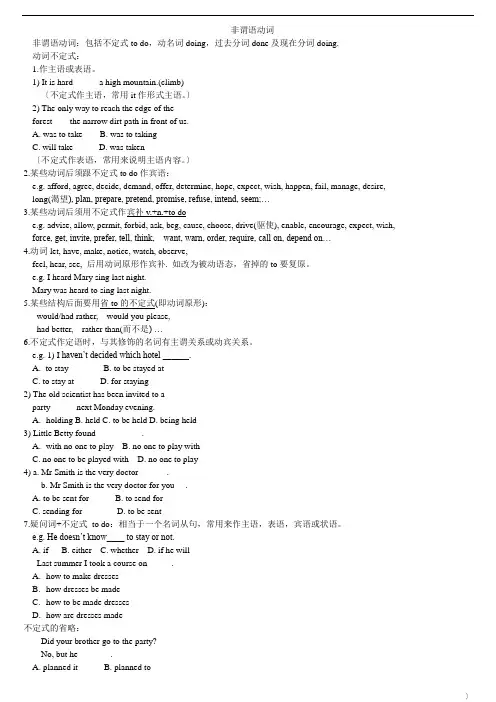
非谓语动词非谓语动词:包括不定式to do,动名词doing,过去分词done及现在分词doing.动词不定式:1.作主语或表语。
1) It is hard _____ a high mountain.(climb)〔不定式作主语,常用it作形式主语。
〕2) The only way to reach the edge of theforest ___ the narrow dirt path in front of us.A. was to takeB. was to takingC. will takeD. was taken〔不定式作表语,常用来说明主语内容。
〕2.某些动词后须跟不定式to do作宾语:e.g. afford, agree, decide, demand, offer, determine, hope, expect, wish, happen, fail, manage, desire, long(渴望), plan, prepare, pretend, promise, refuse, intend, seem;…3.某些动词后须用不定式作宾补v.+n.+to doe.g. advise, allow, permit, forbid, ask, beg, cause, choose, drive(驱使), enable, encourage, expect, wish, force, get, invite, prefer, tell, think, want, warn, order, require, call on, depend on…4.动词let, have, make, notice, watch, observe,feel, hear, see, 后用动词原形作宾补. 如改为被动语态,省掉的to要复原。
e.g. I heard Mary sing last night.Mary was heard to sing last night.5.某些结构后面要用省to的不定式(即动词原形):would/had rather, would you please,had better, rather than(而不是) …6.不定式作定语时,与其修饰的名词有主谓关系或动宾关系。
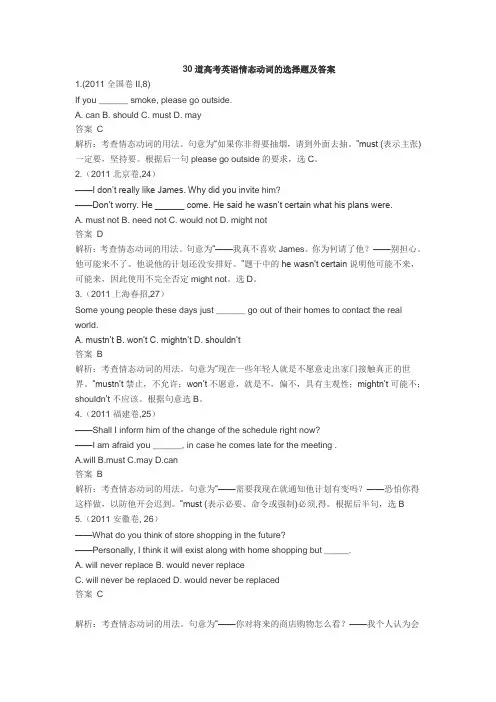
30道高考英语情态动词的选择题及答案1.(2011全国卷II,8)If you ______ smoke, please go outside.A. canB. shouldC. mustD. may答案C解析:考查情态动词的用法。
句意为“如果你非得要抽烟,请到外面去抽。
”must (表示主张)一定要,坚持要。
根据后一句please go outside的要求,选C。
2.(2011北京卷,24)——I don’t really like James. Why did you invit e him?——Don’t worry. He ______ come. He said he wasn’t certain what his plans were.A. must notB. need notC. would notD. might not答案D解析:考查情态动词的用法。
句意为“——我真不喜欢James。
你为何请了他?——别担心。
他可能来不了。
他说他的计划还没安排好。
”题干中的he wasn’t certain说明他可能不来,可能来,因此使用不完全否定might not。
选D。
3.(2011上海春招,27)Some young people these days just ______ go out of their homes to contact the real world.A. mustn’tB. won’tC. mightn’tD. shouldn’t答案B解析:考查情态动词的用法。
句意为“现在一些年轻人就是不愿意走出家门接触真正的世界。
”mustn’t禁止,不允许;won’t不愿意,就是不,偏不,具有主观性;mightn’t可能不;shouldn’t不应该。
根据句意选B。
4.(2011福建卷,25)——Shall I inform him of the change of the schedule right now?——I am afraid you ______, in case he comes late for the meeting .A.willB.mustC.mayD.can答案B解析:考查情态动词的用法。
必修3 Unit 1Festivals around the world世界各地的节日课时作业Ⅰ.单项填空1.(2010届成都市摸底测试)Young drivers under 25 have the highest number of accidents while those over 50 have________.A.the less B.the fewestC.the least D.the fewer2.—Many people are in great need of extra food.—Yes.It is a challenge to________all their needs.A.satisfy B.gainC.practise D.produce3.It is no longer________it was 20 years ago,________it was so poorly equipped.A.what;when B.that;whichC.what;which D.which;that4.—What do you think of the book I lent you yesterday?—Oh,not too bad.It’s not too difficult________.A.to read B.to be readC.reading D.being read5.It looks________you are ill.You should go to see the doctor.A.as B.as thoughC.which D.whether6.—What was she doing when you came in?—She was________the view from the window.A.respecting B.admiringC.gathering D.hunting7.The old photos buried at the bottom of the suitcase________me of those happy old days we had spent together.A.repeated B.remindedC.informed D.remembered8.Even though Jack has failed many times in his experiment,he holds a belief________he will succeed one day if he carries on with it.A.what B.whichC.whether D.that9.The building was named Ford Hall________a man named James Ford.A.in place of B.in celebration ofC.in memory of D.in favour of10.—Has Mr Lee arrived?—No.But it’s already 9 o’clock.He should________at any time.A.bring up B.turn upC.look up D.pick up11.Sir,you are not allowed to enter the building if you don’t get our manager’s________.A.permission B.connectionC.instruction D.introduction12.The headmaster told the boy________the angry teacher,but he refused to.A.to apologize B.apologize toC.to apologize for D.to apologize to13.Scientists found that young babies learn to do things because certain acts leadto________.A.rewards B.prizesC.awards D.results14.It is a good habit to________,for people will always believe in you.A.keep one’s word B.hold one’s breathC.help oneself D.get ready15.Often he________sit for hours doing nothing at all when he was in low spirits.A.should B.wouldC.could D.mightⅡ.完形填空(2010年西安检测) My father enjoys bike riding.Ever since I was little,I’ve always loved going biking with my dad.__1__,as I became a teenager,other thins began to draw my__2__.Suddenly,it was important to do things with__3__.I saw my dad every evening at home.Why did I have to__4__my Sundays to all-day bike trips with him,too?If my indifference (冷漠) hurt him,my father kept__5__,but he would always let me know when he was planning a bike trip__6__I wanted to come.It was a Sunday morning,and I was in low__7__.Two of my friends had gone to the movies without inviting me.Just then my father__8__my room.“It’s a beautiful day.Want to go for a__9__,today,Beck?”“Leave me alone!”I impatiently__10__.Those were the last words I said to him before he left the house that__11__.Several hours later,the police called us,__12__us that Dad had a traffic accident.My father’s injuries were serious.It took several days before he could__13__speak.Beside his bed I eldhishandgently__14__of hurting him.“Daddy...I’m sorry...”“It’s okay,sweetheart.I’ll be okay.”“No,” I said,“I__15__what I said to you that day.You know,that morning?”“Sweetheart,I don’t__16__anything about that day.I remember kissing you goodnight the night before,though.” He__17__a weak smile.I felt regretful for my thoughtless remark,for I__18__,wanted him to leave me alone.My teacher once told me that__19__have immeasurable power.They can hurt or they can heal.And we all have the__20__to choose our words.I intend to do that very carefully from now on.1.A.Therefore B.InsteadC.Besides D.However2.A.attention B.sightC.effort D.energy3.A.Dad B.friendsC.teachers B.brothers4.A.start B.saveC.devote D.waste5.A.silent B.busyC.asleep D.awake6.A.unless B.in caseC.so that D.as if7.A.spirits B.conditionsC.states D.hopes8.A.left B.checkedC.entered D.knocked9.A.ride B.walkC.picnic D.game10.A.whispered B.warnedC.announced D.shouted11.A.moment B.morningC.afternoon D.evening12.A.convincing B.remindingC.informing D.phoning13.A.eventually B.generallyC.strictly D.broadly14.A.tired B.afraidC.aware D.sorry15.A.discuss B.thinkC.care D.mean16.A.hate B.forgetC.remember D.like17.A.got B.expressedC.exchanged D.managed18.A.often B.neverC.even D.once19.A.apologies B.promisesC.smiles D.words20.A.experience B.honorC.power D.desireⅢ.信息匹配(杭州高中2010届高三第三次月考)阅读下列材料,从所给的六个选项(A、B、C、D、E、F)中,选出符合各小题要求的最佳选项。
2011年普通高等学校招生全国统一考试英语本试卷分第一卷(选择题)和第二卷(非选择题)两部分。
考试结束后,将本试卷和答题卡一并交回。
第一卷注意事项:1. 答第一卷前,考生务必将自己的姓名、准考证号填写在本试卷和答题卡相对应的位置上。
2. 选出每小题答案后,用铅笔把答题卡上对应题目的答案标号涂黑。
如需改动,用橡皮擦干净后,再选涂其他答案标号。
不能答在本试卷上,否则无效。
第一部分听力(共两节,满分30分)做题时,先将答案标在试卷上。
录音内容结束后,你将有两分钟的时间将试卷上的答案转涂到答题卡上。
第一节(共5小题;每小题1.5分,满分7.5分)听下面5段对话。
每段对话后有一个小题,从题中所给的A、B、C三个选项中选出最佳选项,并标在试卷的相应位置。
听完每段对话后,你都有10秒钟的时间来回来有关小题和阅读下一小题。
每段对话仅读一遍。
例:How much is the shirt?A. £19.15.B. £9.15.C. £9.18.答案是B。
1. What does the man like about the play?A. The story.B. The ending.C. The actor.2. Which place are the speakers trying to find?A. A hotel.B. A bank.C. A restaurant.3. At what time will the two speakers meet?A. 5:20.B. 5:10.C.4:40.4. What will the man do ?A. Change the plan.B. Wait for a phone call.C. Sort things out.5. What does the woman want to do ?A. See a film with the man.B. Offer the man some helpC. Listen to some great music.第二节(共15小题:每小题1.5分,满分22.5分)听下面5段对话。
2011年全国高考英语试题分类汇编之单项填空名词1.(2011·四川卷)13.Always remember put such dangerous things as lives out of children’s.A.touchB.sightC.reachD.distance2.(2011·江西卷)31.What’s the_____, in your opinion, of helping him if he doesn’t make an effort to help himself?A.sympathyB.themeC.objectD.point3.(2011·湖北卷)21.“Tommy, run! Be quick! The house is on fire!”the mother shouted, with______ clearly in her voices.A . near B. rudeness C. regret D. panic4.(2011·湖北卷)22.Giving up my job to go back to full time caudation was a big________, but now I know it was the best decision I ever made.A. projectB. commitmentC. competitionD. ambition5.(2011·江苏卷)27.Teachers have to constantly update their knowledge in order to maintain their professional ___.A.consequence B.independence C.competence D.intelligence6.(2011·浙江卷)18.Anyway,I can't cheat him-it's against all my________.A. emotionsB. principlesC. regulationsD. opinions7.(2011·山东卷)34. There’s a _____ in our office that when it’s somebody’s birthday, they bring in a cake for us a ll to share.A. traditionB. balanceC. concernD. relationship8.(2011·福建卷)26.The lack of eco-friendly habits among the public is thought to be a major of global climate change.A.resultB.causeC.warningD.reflection冠词1.(2011·全国II)16. As he reached _____front door, Jack saw ______strange sight.A. the;不填B. a; theC.不填aD. the; a2.(2011·陕西卷)13.As is know to all, People’s Republic of China is Biggest developing country in the world.A.the ;不填B. 不填;theC. the ;theD. 不填;不填3.(2011·四川卷)18.Dr.Peter Spemce, headmaster of the school,told us, fifth of pupils here go on to study at Oxford and Cambridge.A.不填;AB.不填;TheC.the;TheD.a;A4.(2011·江西卷)22.------It’s said John will be in a job paying over 860,00 _____ year----- also get paid by _____ week.A. the; theB. a; theC.D.a;a5.(2011·全国新课标卷)33.It is generally accepted that boy must learn to stand up and fight like man.A. a; aB. a; theC. the; theD. a; 不填6.(2011·浙江卷)2.Experts think that ____recently discovered painting may be _____ Picasso.A.the.不填B.a;theC.a;不填D.the;a7.(2011·山东卷)21.Take your time-it’s just_____short distance from here to_____restaurant.A.不填;theB. a; theC. the; aD.不填;a8.(2011·重庆卷)26. In communication, a smile is usually ___________ strong sign of a friendly and _______ open attitude.A. the, /B. a, anC. a, /D. the, an代词1.(2011·北京卷)34.The employment rate has continued to rise in big cities thanks to the efforts of the local governments to increase_______ .A. thenB. thoseC. itD. that2.(2011·天津卷)1. We feel our duty to make our country a better place.A. itB. thisC. thatD. one3.(2011·江西卷)25..Why don’t you bring _____ to his attention ill to work on?A. thatB.itC.hisD.him4.(2011·全国II)11.I got this bicycle for______:My friend gave it to me when she bought a new one.A. everythingB. somethingC. anythingD. nothing5.(2011·陕西卷)16.-Would you get me a bar of chocolate from the kitchen,dear?- one?A.OtherB.EveryC.AnotherD.More6.(2011·四川卷)3.There is in his words.We should have a try.A. somethingB. anythingC.nothingD.everything7.(2011·辽宁卷)27.- Would you like tea or coffee?- , thank you. I've just had some water.A. EitherB. BothC. AnyD. Neither8.(2011·湖南卷)24.I know that _____ would ever discourage him he would never give up to be a director.A. somethingB. anythingC. everythingD. nothing9.(2011·安徽卷)22.Surprisingly, Susa n’s beautiful hair reached below her knees and made_____ almost an overcoat for her.A. themB. herC. itselfD. herself10.(2011·山东卷)24. The two girls are so alike that the strangers find______difficult to tell from one to the other.A.itB. themC. herD.that11.(2011·重庆卷)27.——Silly me! I forget what my luggage looks like.——What do you think of over there?A.the oneB.thisC.itD.that12.(2011·福建卷)21. We have various summer camps for your holidays, you can choose ____ based on your own interests.A. eitherB. eachC. oneD. it介词1.(2011·湖北卷)30.When asked about their opinion about the schoolmaster ,many teachers would prefer to see him step aside younger men.A. in terms ofB. in need ofC. in favor ofD. in praise of2.(2011·全国II)14. This shop will be closed for repairs______further notice.A. withB. untilC. forD. at3.(2011·四川卷)8.Nick, it’s good for you to read some books __________China before you start your trip there.A. inB. forC. ofD. on4.(2011·北京卷)35. With new technology, pictures of underwater valleys can be taken color.A. byB. forC. withD. in5.(2011·天津卷)11. He was a good student and scored _________ average in most subjects.A. belowB. ofC. onD. above6.(2011·江苏卷)32.We’d better discuss everything _______ before we work out the plan.A.in detail B.in general C.on purpose D.on time7.(2011·全国新课标卷)30.The form cannot be signed by anyone yourself.A. rather thanB. other thanC. more thanD. better than8.(2011·浙江卷)5.I always wanted to do the job which I'd been trained .A. onB. forC. byD. of9.(2011·安徽卷)25.Sometimes proper answers are not far to seek______ food safety problem.A. inB. toC. onD. after10.(2011·山东卷)30.I’m sorry I didn’t phone you, but I’ve been very busy_____ the past couple of weeks.A. beyondB. withC. amongD. over11.(2011·重庆卷)24.Shirley, a real book lover, often brings home many books to read __________ the library.A. inB. forC. byD. from12.(2011·福建卷)22. good service, the restaurant offers different kinds of traditional Fujian dishes.A. Far fromB. Apart fromC. instead ofD. Regardless of形容词1.(2011·江西卷)24.-----The film is , I have to say, not a bit interesting.------Why? It’s ______ than the films I have ever seen.A. far more interestingB.much less interestingC. no more interestingD.any less interesting2.(2011·四川卷)12.—How are your recent trip to Sichuan?—I’ve never had one before.A.a pleasantB.a more pleasantC.a most pleasantD.the most pleasant3.(2011·全国II)17.Mr. Stevenson is great to work for----I really couldn't ask for a_boss.A. betterB. goodC. bestD. still better4.(2011·陕西卷)17.The new stadium being built for the next Asian Games will be the present one。
专题六非谓语动词C . ledD . to lead4 . (2011 年高考天津卷 )Passengers are permitted ____ only one piece of hand luggage onto the plane. A . to carry B . carrying C . to be carriedD . being carried5 . (2011 年高考上海卷 )Today we have chat rooms , text messaging emailing...but we seem the art of communicating facetoface. A . losing B . to be losing C . to be lost D . having lost核心考点突破 here to spend some time with you.B . invitingD . to inviteD . being discoveredus thenecessary help. A . to give B . giving C . to be given D . given10. We sometimes imagine a desert island _______ a sort of paradise , where the sun alwaysshines. A . be B . being C .不填D . Is11. My parents have always made me _______ about myself , even when I was twelve.1.(2011年高考大纲全国卷 )The island , to the mainland by a bridge, is easy to goto. C . B . to join2. joining joinedD . having joinednothing about the argument. A . says C . to say D . saying 3 . (2011 年高考山东卷)Look over there — there's a very long, winding path house. A . leadingB . saidup totheB . leads6」t is my honor 7. The purpose of new technology is to make life easier ,__A . not makingB . not makeC . not to makeD . to not make8. ________________________________________________ T here were many talented actors out there just waiting ____ A . to discover B . to be discovered it more difficult.A . feeling wellB . feeling goodC . feel wellD . feel good12. His first book ______ next month is based on a true story.A. publishedB . to be publishedC . to publishD . being published13. (2011 年高考湖南卷)The ability ____ an idea is as important as the idea itself.A . expressingB . expressedC . to expressD . to be expressed14. We were astonished ______ the temple still in its original condition. A . finding B . to find C . find D . to be found15. With Father's Day around the corner , I have taken some money out of the bank presentsfor my dad. A . buy B . to buy C . buyingD . to have bought 16. Do you think you are brave enough _______ b ungee jumping? A . trying B . in trying C . to try D . and try17. As a journalist you should first decide what events ___________ before you make someinterviews. B . to report D . reportingthat famous university will be the only way to become a worldB . attended D . having attendedanything in the supermarket when he was questioned by theA . reported C . to be reported 18. In my mind , class writer.A . attending C . attend 佃.The manpolice. A . to have stolen C . having stolen 20」had great difficulty A . find C . to findB . having been stealing D . to stealthe suitable food on the menu in that restaurant.B . foundD . findingC . discoveringD . having discovered25. (2011 年高考浙江卷)Even the best writers sometimes find themselves21.— Robert is indeed a wise man. —Oh , yes.How often I have regretted A . to takeC . not to take his advice! B . takingD . not taking 22」n April , thousands of holidaymakers remained cloud.abroad due to the volcanic ashA . sticking C . to be stuckB . stuck23I'm calling to enquire about the positionA . advertised C . advertising24.So far nobody has claimed the money _A . discoveredD . to have stuck _____ i D . having adverti sedfor words.A. loseB. lostC. to lose D . having lost26. (2011 年高考天津卷)_____ into English, the sentence was found to have an entirely different word order.A. Translating B . TranslatedC . To translateD . Having translated高考秘笈27. The living room is clean and tidy , with a dining table already ________ f or a meal to be cooked.A . laidB . layingC . to layD . being laid非谓语动词答案1. 解析:句意:这个岛屿由一座桥和大陆相连,很容易到达。
2011年全国高考英语短文改错试题分析一.(2011新课标)第一节短文改错(共10小题;每小题1分,满分10分)假定英语课上老师要求同桌之间交换修改作文,请你修改你同桌写的以下作文。
文中共有10处语言错误,每句中最多有两处,每处错误仅涉及一个单词的增加、删除或修改。
增加:在缺词处加一个漏字符号(∧),并在其下面写出该加的词。
删除:把多余的词用斜线(\)划掉。
修改:在错的词下划一横线,并在该词下面写出修改后的词。
注意:1.每处错误及其修改均限一词。
2.只允许修改10处,多者(从第11处起)不计分。
My summer travel started terribly .I was at the Shanghai Railway Station buy a ticket to Hang Zhou. I was going to visit a friend here and after that I would go to Xiamen for long hol iday. I bought my ticket but turned around to pick up my bag Form the floor and then I realized that someone had stolen it. Luckily I had all my money on my pocket,but the only clothes I had was those I had on.It felt very strange to travel without any luggages. When I finally arrived at my friend he lent to me lots of clothes. I feel very happy that I could change my clothes at last.1改buy为buying。
绝密★启用前2011年普通高等学校招生全国统一考试全国卷英语听力试题2011年高考 全国I卷 英语听力音频 双击图标打开收听.mp3(请用电脑,双击上面图标,打开收听)注意事项:1. 答卷前,考生务必将自己的姓名、考生号等填写在答题卡和试卷指定位置上。
2. 回答选择题时,选出每小题答案后,用铅笔把答题卡上对应题目的答案标号涂黑。
如需改动,用橡皮擦干净后,再选涂其它答案标号,回答非选择题时,将答案写在答题卡上,写在本试卷上无效。
3. 考试结束后,将本试卷和答案卡一并交回。
一、听力(共两节,满分30分)回答听力部分时,请先将答案划在试卷相应位置。
听力部分结束前,你将有两分钟的时间,将试卷上的答案转涂到答题卡上。
第一节(共5小题;每小题1.5分,满分7.5分)听下面五段对话。
每段对话后有一小题,从题中所给的A、B、C三个选项中选出最佳选项,并标在试卷的相应位置。
听完每段对话后,你都有10秒钟的时间来回答有关小题和阅读下一小题。
每段对话仅读一遍。
例:How much is the shirt?A. £19.15.B. £9.15.C. £9.18.答案是B。
1. What does the man like about the play?A. The story.B. The ending.C. The actor.2. Which place are the speakers trying to find?A. A hotel.B. A bank.C. A restaurant.3. At what time will the two speakers meet?A. 5:20.B. 5:10.C.4:40.4. What will the man do?A. Change the plan.B. Wait for a phone call.C. Sort things out.5. What does the woman want to do?A. See a film with the man.B. Offer the man some helpC. Listen to some great music.第二节(共15小题;每小题1 5分,满分22 .5分)听下面5段对话。
2011年普通高等学校招生全国统一考试(浙江卷)英语试题解析第一部分英语知识运用(共两节,满分80分)从A B C D 四个选项中,选出可以填入空白处地最佳选项,并在答题卡上将该项涂黑。
1. -I’m sorry I didn’t make it to your party last night.-- ______, I know you’re busy these days.A. Of courseB. No kiddingC. That’s all nightD. Don’t mention it【答案】C【解析】情景交际今年首次出现在第一题,说明了高考重视应用的趋势。
完整的问句和答句的后半句都是提示信息:根据问句中的I’msorry…可以排除选项A、B;根据后半句―我知道你最近几天很忙‖可以排除选项D。
2. Experts think that ______recently discovered painting may be ______ Picsso.A. the ;不填B. a ;theC. a; 不填D. the; a【答案】D【解析】本题考点为冠词,每年必考一题,常为区分某名词是特指还是泛指。
根据句意―专家们认为这幅最近本发现的画作可能是一幅毕加索的作品。
‖可知前一空应该是表示特指的定冠词the;后一空用不定冠词a加上毕加索的名字(该单词学生在不认识的情况下,可以观察到其开头字母大写,应该是人名或地名类的专有名词,再由全句判断得出词义),表示其众多作品之一,泛指。
3. Bats are surprisingly long lived creatures some ______a life span of around 20 years.A. havingB. hadC. haveD. to have【答案】A【解析】本题的考点为独立主格结构,判断依据是逗号前后主语不同,前者是所有蝙蝠,而后者是某些蝙蝠(主语前后不一致又没有用连词引导的从句结构,这是少见的―独立主格‖标志)。
题干主句意为―蝙蝠是一种长寿得令人吃惊的造物‖,主谓宾成分俱全,可以确定后面的部分为修饰性的―补充说明型‖独立主格,相当于一个并列句,通常放在句末,主动关系,形式为:逻辑主语+现在分词=somehaving。
4. One Friday, we were packing to leave for a weekend away ______my daughter heard cries for help.A. afterB. whileC. sinceD. when【答案】D【解析】本题考点为状语从句的连词,在初中阶段就是重点。
题干里的前面一个成分俱全的句子为主句,时态为进行时,故排除选项A、C;连词后面的句子一定是从句,时态为一般时,故排除B。
意思是―……当我女儿听到呼救声时,我们正在打包准备外出一周。
‖5. I always wanted to do the job which I’d been trained ______.A. onB. forC. byD. of【答案】B【解析】本题考点为动词搭配,需要考生注意平时积累,或也可以从所跟的介词辨析大胆推测短语意思。
train做动词意为―训练‖,主句意思是―我总想从事……的工作‖,后面的定语从句说明是什么样的工作,应该是―我一直以来(完成时)为此(for)被训练(被动式)的‖,介词for表目的。
其余选项trainon锻炼得有所改善;trainby和trainof并无习惯语义。
6. The school isn’t the one I really wanted to go to, but I suppose I’ll just have to ______it,A. make the best ofB. get away fromC. keep an eye onD. catch up with【答案】A【解析】本题考题为习语辨析,没有生词,注重平时积累和语境分析。
选项A意为―充分利用;尽力而为;妥善处理‖;选项B意为―避免,摆脱;逃离‖;选项C意为―照看;密切注视‖;选项D意为―赶上,追上;逮捕‖。
题干是转折句(逗号后有but),前半句完整表达―这所学校不是我真正想去的‖,后面―但是我将不得不……‖应该选表示肯定的、积极的意思―尽力而为或者善用它‖。
7. Since people are fond of humor, it is as well in conversation as _______ else.A. anythingB. somethingC. anywhereD. somewhere【答案】A【解析】考查省略句和句子成分。
当句中出现as…as…―像……一样‖时,考生应该确定前后两个部分是可比较的,也就是是词性或者结构必须相同。
这里还原整句itisaswelcomeinconversationasitisin…else.这里的…必须跟前面的conversation词性统一,再结合句意应该选A.anything(名词,任何事请)。
8. English is a language shared by several diverse cultures, each of ______ uses it somewhatdifferently.A. whichB. whatC. themD. those【答案】A【解析】考点为高一重点非限制性定语从句,其实考生看到那标志性的逗号就应该有所觉悟。
前面主句完成不缺成分,故后面部分一定为状语或定语从句,根据句意可以判断出后面是对前面cultures的解释,则确定是定语从句cultures即先行词,排除B(并非名词性从句)、C (代词,引导从句不当)、D(副词,词不达意)。
9. The p rofessor could tell by the _____ look in Maria’s eyes that she didn’t understand a single word of his lecture.A. coldB. blankC. innocentD. fresh【答案】C【解析】本题考查词汇,根据后半句提供的信息选择答案。
That后面的从句完整表达了―她一点都不懂他的讲座‖可得知前面空格处应该填―无知的‖,选项C.innocent(无知的;无辜的)符合题意。
10. A bank is the place ______ they lend you an umbrella in fair weather and ask for it back whenit begins to rain.A. whenB. thatC. whereD. there【答案】C【解析】主句主系表结构俱全,后面一定是起修饰作用的定语或状语从句,看意思从句是在解释前面的place是一个怎么样的地方,确定是定语从句且先行词即place。
而从句主谓宾结构俱全也不缺成分,因此用连接副词where在从句中代替place充当状语。
句子的中文直译:银行,是在天晴之时借伞给你、到了下起雨来之时就催你还回去的地方。
11. --- How’s your new babysitter?--- We ______ ask for a better one. All our kids love her so much.A. shouldB. mightC. mustn’tD. couldn’t【答案】D【解析】本题考点为情态动词结合语境的用法,高一的重点。
首句问对方的保姆怎么样,答句的后面句完整表达了―我们孩子都非常喜欢她。
‖,那么答句的前半句―我们……要求一个更好的。
‖一定是否定才符合语境,排除A、B,选项C.musn’t表示―禁止做……‖辞不达意,故而选D,―我们不能找到更好的了‖。
12. He decided that he would drive all the way home instead of ______ at a hotel for the night.A. putting downB. putting offC. putting onD. putting up【答案】D【解析】本题考查惯用词组的引申义,注意平时积累。
根据句意我们可以知道这里应该是填一个有―住下‖含义的词组,肯定不是这些put系列词组的基本义,其中putup除了―举起‖之意外,还有―留宿‖的意思,符合题意。
13. I’ve been writing this report ______ for the last two weeks, but it has to be handed intomorrow.A. finallyB. immediatelyC. occasionallyD. certainly【答案】C【解析】考查词汇结合语境的用法。
前半句说话人―写报道‖用了进行时,再加上后半句是―明天必须上交‖,说明没有写完因此不能是时间点标志的副词finally(最后)、immediately(立刻),而occasionally(偶尔,间或)符合句意。
D选项certainly(当然)是干扰选项不贴切句意。
14. Even the best writers sometimes find themselves ______ for words.A. loseB. lostC. to loseD. having lost【答案】B【解析】此题考查仍是非谓语动词,或也可以从Lostforwords.(欲言又止;迷失语言)这一习语来理解。
此题易误选C,考生可能会将findsb.todo跟findoneself(tobe)done混淆。
根据句意可知谓语动词是find―发现‖,―即使最好的作家有时也会发现自己……‖,四个选项围绕lose变化。
动词lose的基本义是―使……迷路‖,引申义是―使……沉溺于‖(使动用法容易被考生忽略),跟逻辑主语themselves的关系是被动,只有选项B满足。
15. The manager was worried about the press conference his assistant ______ in his place but,luckily, everything was going on smoothly.A. gaveB. givesC. was givingD. had given【答案】D【解析】本题考点为动词时态,四个选项围绕动词give变化且没有被动式或者不定式(不是考非谓语动词了)。